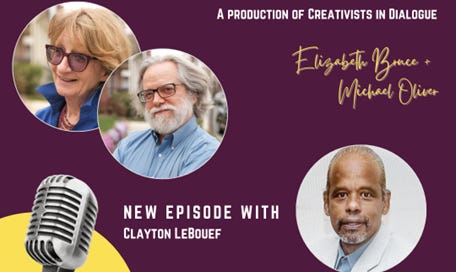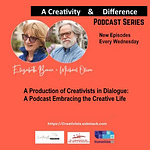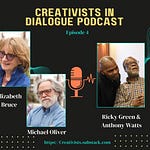Today, we present another Theatre in Community podcast, Part 2 of our conversation with longtime friend and theater colleague Clayton LeBouef.
Clayton is an American actor, playwright, activist, and producer, best known for his recurring television role as Colonel George Barnfather in Homicide: Life on the Street, and in the 2000 epilogue, Homicide: The Movie.
In 2000, he also appeared in the award-winning miniseries, The Corner, and in 2002, he played Wendell Orlando Blocker in the renowned long-form television drama, The Wire. Clayton also appeared in the HBO movie Something the Lord Made with Mos Def and in many episodes of Law and Order: Criminal Intent and Law and Order: SVU.
His portrayal of barbershop owner Tom Taylor in the short film The Doll won him Best Actor honors at the San Diego Black Film Festival. As a stage actor, he has performed widely in the Washington, Baltimore region and nationally, including as a repertory company member in Howard Sackler's The Great White Hope, directed by Molly Smith, and August Wilson's Gem of the Ocean at Arena Stage; in A Soldier’s Play at Source Theater; at Anacostia Playhouse in his play, RS/24; and as the title character in Derek Walcott's Ti-Jean and His Brothers at Sanctuary Theater. A playwright, DJ, activist, and spoken word poet, Clayton's play, Shero: The Livication of Henrietta Venton Davis, was commissioned by Baltimore's Center Stage. His play, Tied Apart, addresses apartheid in South Africa.
And his recent play, RS/24, features a record store owner selling vinyl of the musical greats. Born in Yonkers, New York, Clayton attended Carnegie Mellon University before moving to Washington, D. C. in 1974. He is married to Zuella Evans, and they have two adult daughters.
For more information about Clayton, click here.
Glossary
· Life on the Killing Streets [Homicide: a Year on the Killing Streets]
· Mr. McGinty and the Takoma Theater
· RS/24
We are eager to hear from our subscribers. If you like the conversation or have a comment or a question, use the comment feature or the heart button below. And thanks in advance for sharing this podcast with your friends and colleagues.
To those of you who are FREE subscribers, please consider becoming a PAID subscriber so that Creativists in Dialogue and its Theatre in Community Project can continue bringing you interesting and insightful conversations about creativity and theatre from DC and beyond.
Special shout out to Creativists in Dialogue’s Audio Engineer Elliot Lanes, our Social Media Manager Erinn Dumas of Dumas83, and our Transcription Editor Morgan Musselman.
For more information about Creativists in Dialogue or our other projects, please visit elizabethbruceDC.com or rmichaeloliver.com.
This project is supported by the DC Commission on the Arts and Humanities, HumanitiesDC, and by subscribers like you.






Share this post